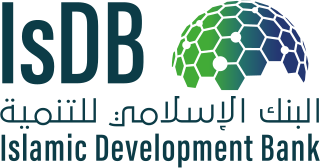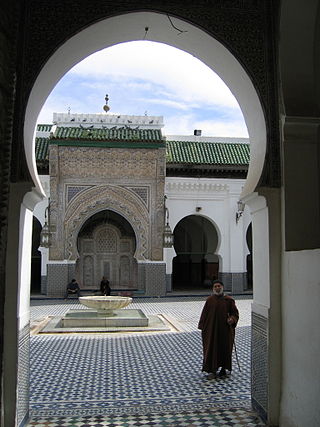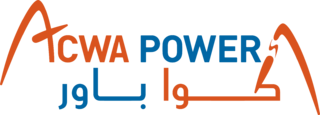Related Research Articles

The Islamic Development Bank is a multilateral development finance institution that is focused on Islamic finance for infrastructure development and located in Jeddah, Saudi Arabia. There are 57 shareholding member states with the largest single shareholder being Saudi Arabia.

The African Development Bank Group (AfDB) or Banque Africaine de Développement (BAD) is a multilateral development finance institution headquartered in Abidjan, Ivory Coast, since September 2014. The AfDB is a financial provider to African governments and private companies investing in the regional member countries (RMC).
An international financial institution (IFI) is a financial institution that has been established by more than one country, and hence is subject to international law. Its owners or shareholders are generally national governments, although other international institutions and other organizations occasionally figure as shareholders. The most prominent IFIs are creations of multiple nations, although some bilateral financial institutions exist and are technically IFIs. The best known IFIs were established after World War II to assist in the reconstruction of Europe and provide mechanisms for international cooperation in managing the global financial system.

FMO is a Dutch development bank structured as a bilateral private-sector international financial institution based in the Hague, the Netherlands. FMO manages funds for the Ministries of Foreign Affairs and Economic Affairs of the Dutch government to maximize the development impact of private sector investments. It is licensed as a bank and supervised by the Dutch Central Bank.
The Climate Investment Funds (CIF) was established in 2008 as a multilateral climate fund in order to finance pilot projects in developing countries at the request of the G8 and G20. The CIF administers a collection of programs with a view to helping nations fight the impacts of climate change and accelerate their shift to a low-carbon economy. Through contributions from 14 donor countries, CIF supports more than 350 projects in 72 low and middle-income countries on the frontlines of the climate crisis.

As of April 2020, the energy sector in Senegal has an installed capacity of 1431 megawatts (MW). Energy is produced by private operators and sold to the Senelec energy corporation. According to a 2020 report by the International Energy Agency, Senegal had nearly 70% of the country connected to the national grid. Current government strategies for electrification include investments in off-grid solar and connection to the grid.

Science and technology in Morocco has significantly developed in recent years. The Moroccan government has been implementing reforms to encourage scientific research in the Kingdom. While research has yet to acquire the status of a national priority in Morocco, the country does have major assets that could transform its R&D sector into a key vehicle for development. The industry remains dominated by the public sector, with the universities employing 58% of researchers. Morocco's own evaluation of its national research system – carried out in 2003 – revealed that the country has a good supply of well trained high quality human resources and that some laboratories are of very high quality. However, the greatest gap at that point of time lied in the link between research and innovation. The educational qualifications of Moroccan researchers have increased significantly since the early 1990s. The University of Al-Karaouine is considered the oldest continuously operating academic degree-granting university in the world.

As of 2019, renewable energy in Morocco covered 35% of the country’s electricity needs.

Solar power in South Africa includes photovoltaics (PV) as well as concentrated solar power (CSP). As of 2023, South Africa had over 2700 MW of installed PV solar power capacity in its grid, in addition to 500 MW of CSP. Installed capacity is expected to reach 8,400 MW by 2030.

Solar power in Morocco is enabled by the country having one of the highest rates of solar insolation among other countries— about 3,000 hours per year of sunshine but up to 3,600 hours in the desert. Morocco has launched one of the world’s largest solar energy projects costing an estimated $9 billion. The aim of the project was to create 2,000 megawatts of solar generation capacity by 2020. The Moroccan Agency for Solar Energy (MASEN), a public-private venture, was established to lead the project. The first plant, Ouarzazate Solar Power Station, was commissioned in 2016.
Made In Africa Foundation is an organisation established in 2011 to assist development of the African continent by providing first-stage funding for feasibility studies and business development of large-scale infrastructure projects based in the region.

Most of Kenya's electricity is generated by renewable energy sources. Access to reliable, affordable, and sustainable energy is one of the 17 main goals of the United Nations’ Sustainable Development Goals. Development of the energy sector is also critical to help Kenya achieve the goals in Kenya Vision 2030 to become a newly industrializing, middle-income country. With an installed power capacity of 2,819 MW, Kenya currently generates 826 MW hydroelectric power, 828 geothermal power, 749 MW thermal power, 331 MW wind power, and the rest from solar and biomass sources. Kenya is the largest geothermal energy producer in Africa and also has the largest wind farm on the continent. In March 2011, Kenya opened Africa's first carbon exchange to promote investments in renewable energy projects. Kenya has also been selected as a pilot country under the Scaling-Up Renewable Energy Programmes in Low Income Countries Programme to increase deployment of renewable energy solutions in low-income countries. Despite significant strides in renewable energy development, about a quarter of the Kenyan population still lacks access to electricity, necessitating policy changes to diversify the energy generation mix and promote public-private partnerships for financing renewable energy projects.

ACWA Power is a developer, investor, co-owner and operator of a portfolio of power generation and desalinated water production plants with a presence in 12 countries across the Middle East, Africa, Central and South-East Asia. ACWA Power's portfolio of projects in operation and development has an investment value of USD 82.8 billion, and a capacity of 53.7 GW of power and 7.6 million m3/day of desalinated water.
Shelter Afrique (SAf), also known as Company for Habitat and Housing in Africa, is a pan-African finance institution created to exclusively support the development of the African real estate and housing sector. Through its strategic partnerships, it offers products and related services which support the efficient delivery of commercial real estate and affordable housing.
Africa Finance Corporation (AFC) is a pan-African Multilateral Development Financial Institution established in 2007 by sovereign African states to provide pragmatic solutions to Africa's infrastructure deficit and challenging operating environment. The Corporation bridges the infrastructure investment gap through the provision of debt and equity finance, project development, technical and financial advisory services.

Bank of Industry Limited is Nigeria's oldest and largest Development Finance Institution (DFI) currently operating. It is owned by the Ministry of Finance Incorporated (MOFI) Nigeria (94.80%), the Central Bank of Nigeria (CBN) (5.19%) and private shareholders (0.01%).
African Reinsurance Corporation, generally known as Africa Re, is a reinsurance company based in Lagos, Nigeria. Africa Re was founded on 24 February 1976 in Yaoundé, Cameroon making it Africa's first continental reinsurer. The company operates in 41 countries of the African Union through approximately 107 insurance/reinsurance companies.
Ruzizi III Hydroelectric Power Station is a proposed hydropower plant with planned capacity installation of 206 MW when completed.
The ECOWAS Bank for Investment and Development(EBID) is a leading regional investment and development bank, owned by the fifteen Economic Community of West African States (ECOWAS) Member States.
The Mmadinare Solar Power Station is a 120 MW (160,000 hp) solar power station, under development in Botswana. The solar farm will be developed in two phases of 60 megawatts each. Scatec, the Norwegian independent power producer (IPP) owns the project and Botswana Power Corporation (BPC), the national electricity utility company is the power off-taker, under a 25-year power purchase agreement.
References
- ↑ "Africa50 to issue up to sh324b to private projects". www.newvision.co.ug. Retrieved 2018-02-06.
- ↑ Blas, Javier (1 May 2014). "Africa set to gain $3bn infrastructure fund". Financial Times. Retrieved 2018-02-06.
- ↑ "Africa50 infrastructure fund to reach $1bn". www.publicfinanceinternational.org. Retrieved 2018-02-06.
- ↑ Agutamba, Kenneth (31 May 2015). "Africa50: Continent's infrastructure hope" . Retrieved 6 February 2018.
- ↑ "The Africa50 Fund is Now Operational in Casablanca Finance City". Morocco On The Move. 2014-09-04. Retrieved 2018-02-06.
- ↑ Madongo, Irene (31 December 2013). "Private equity in Africa: warming up for 2014". Financial Times. Retrieved 2018-02-06.
- ↑ "Africa50 Infrastructure Fund: Private Company Information". Bloomberg. 2017-09-12. Retrieved 2018-02-06.
- ↑ Koigi, Bob (2017-09-14). "Guinea and DR Congo join Africa50". Africabusinesscommunities.com. Retrieved 2018-02-06.
- ↑ "Africa50 fund open by year end — AfDB head" . Retrieved 2018-02-06.
- ↑ "Africa50 - ICA". Icafrica.org. Retrieved 2018-02-06.
- ↑ "Scatec Solar partners Africa50 on 100 MW project in Nigeria". Financialnigeria.com. 2016-12-19. Retrieved 2018-02-06.
- ↑ "Africa50 shines with Egyptian solar plants". ESI-Africa.com. 30 October 2017. Retrieved 2018-02-06.
- ↑ "Sénélec : Africa50 s'associe à la Senelec pour développer les 120 MW de la centrale de Malicounda".